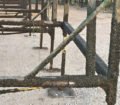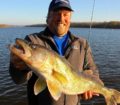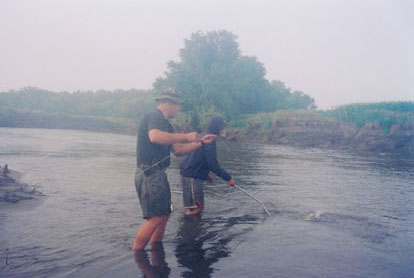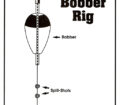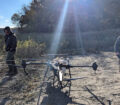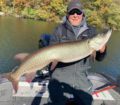By Steve Weisman
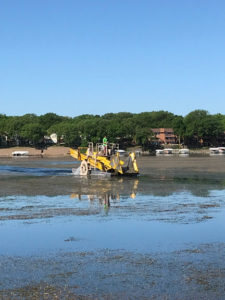
(photo by Steve Weisman) In addition to the approved chemical treatment, the plan includes mechanically harvesting an additional 40 acres of curlyleaf pondweed.
Part of the management plan approved by the Iowa DNR and local leaders to combat the curlyleaf pondweed in portions of the Iowa Great Lakes included a chemical application of Aquathol-K. On May 9, 10 acres on the North Bay of East Okoboji and another 10 acres in Lower Gar were treated using this herbicide.
Aquathol-K was chosen because it is effective against curlyleaf pondweed and has very few label restrictions. Contact with the water after treatment is considered safe and there are no restrictions for fishing or recreational activities in treated water. In addition, Aquathol-K breaks down fast in the environment and is approved for use on drinking water sources lakes.
Even with these levels of safety, the treatment plan included areas more than five miles from drinking water intakes to further address some local concerns. The treatment plan called for application only in areas that were unlikely to impact drinking water.
Scientists at the Iowa Lakeside Laboratory coordinated monitoring of the application. According to Mary Skopec, executive director of the Lakeside Laboratory, water monitoring showed encouraging results. “The amount of chemical that showed up in our water sampling near the HWY 9 Bridge showed 3.8 parts per billion the next day and 1.2 parts per billion a week later, which is significantly below the drinking water standard of 100 parts per billion. At the same time, oxygen levels remained high and there was no impact on the fishery.”
In the treatment areas, the application did its job and stopped curlyleaf pondweed from growing. So, for this year’s initial application, the results show promise for future years.
Iowa DNR Fisheries Biologist Mike Hawkins notes, “It should be mentioned that a herbicide like Aquathol-K cannot wipe out curlyleaf pondweed. It is an expensive product that must be applied in a very small window in the spring. It should be considered for spot treatment in critical areas and used as a part of an overall plan.”
In conjunction with the 2018 herbicide treatment, a local contractor has been working with the City of Orleans and the East Okoboji Lakes Improvement Corporation to mechanically harvest an additional 40 acres of the plant
Warning to lake home owners: DO NOT APPLY CHEMICALS IN THE WATER
Lots of lake home owners in the Iowa Great Lakes chain have become frustrated with dense weed growth around their docks. Unfortunately, some have been taking it on themselves to place chemicals in the water to alleviate the problem. Names aren’t often given, but the rumors are there and neighbors are seeing this happening, even on West Okoboji, which is a water source for human consumption.
The issue? Many of the chemicals being used are not designed for water, some are ineffective, some are dangerous if not applied correctly and some are even carcinogenic. This becomes pretty scary stuff, when you realize West Okoboji and Big Spirit Lake provide drinking water for several communities.
Hawkins adds, “One of the main points that came out of our community working group was the need to do better outreach and better education about the dangers of lake home shore owners putting herbicides or other chemicals into the lake to try to treat ‘weeds’ themselves. Not only is that strictly prohibited by the law, it also could be unsafe if it’s applied improperly. So, we want to be sure people aren’t doing that.”
The bottom line? DO NOT APPLY CHEMICALS YOURSELF-that is the law. The word is out, and the DNR and law enforcement are going to crack down on this this year. A new law passed this year by the Iowa Legislature this year makes illegal application of pesticides in the Iowa Great Lakes a criminal misdemeanor and could receive a fine of up to $1000.
Lake shore owners do have legal ways to deal with the plants. They can do that through mechanical cutting, hand pulling, hand raking, etc. They can do this themselves or contract a lake service provider to remove weeds for them. It may not be as convenient, but it is definitely much safer and better for the lake. Skopec notes, “Ultimately the aquatic plants help the lakes by pulling nutrients from the water and creating healthy areas for fish.”
Hawkins adds, “There are many beneficial native plants growing in our lakes. Not everything is curlyleaf pondweed and those native plants should be considered one of the main reasons our lake water quality remains some of the best in the region.”

